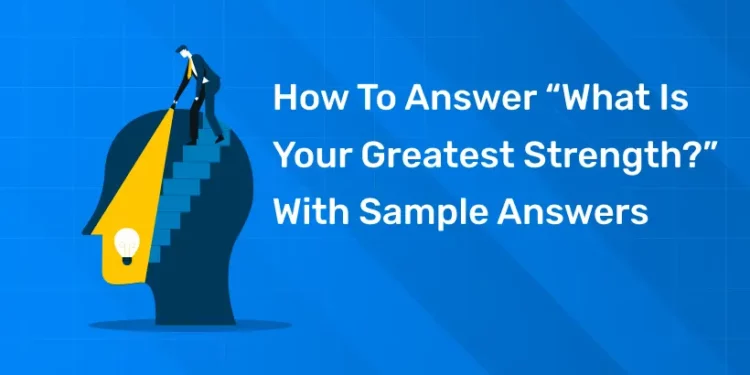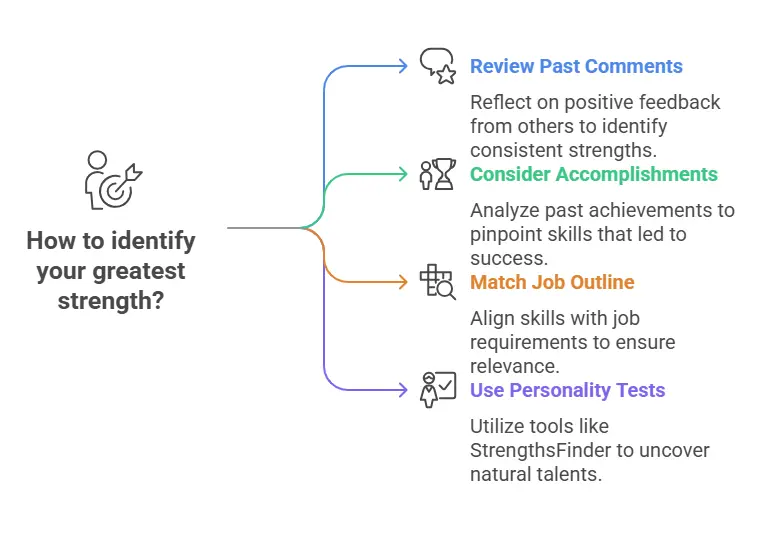Table of Contents
During an interview, “What is your greatest strength?” is a basic yet important question to be asked. It may look like an opportunity to brag at first sight. In life, however, this question reveals how well you know yourself, how self-assured you are, and how familiar you are with the type of work you are interviewing for. You may shine and be an A-player if you answer in a bold manner. In this blog post, we will help you figure out your strengths, how to give a good, interesting response, and give examples of responses for different jobs and experiences.
Begin Your Personality Transformation- Enroll Today!
How to Identify Your Greatest Strength
To figure out what your biggest strength is, think about times when you did well or got praise. Think about the things you like to do and are good at. These are often signs of natural skills. Consider feedback from peers, managers, or teachers, and look for patterns in what people consistently appreciate about you. Also, make sure that your skills are relevant and useful for the job you’re looking for by matching them.
Take some time to think about your skills and experiences and what other people like about you before you go to an interview. To make it easier, do this:
1. Look over past comments
Think about what teachers, bosses, coworkers, or friends have said nice things about you. Are you always the one who figures things out when things get tough? Do people believe you can run projects?
2. Think about what you’ve accomplished
Think about times when you made a difference in your personal, work, or school life. What skills or traits helped you do well?
3. Make sure it fits the job outline
Pick a skill that fits the job you’re looking for. If you’re looking for a job in customer service, it makes more sense to talk about your speaking skills than your computer skills.
4. Use tests of personality
You can make it easier to talk about your natural skills with tools like StrengthsFinder and Myers-Briggs.
Tips for Structuring Your Answer
When someone asks you, “What is your biggest strength?” frame your answer with the STAR method: Situation, Task, Action, and Result. Begin by quickly setting the scene. Then, talk about what you needed to do. Next, describe the steps you took that used your strength. Finally, talk about the good result. To make your answer interesting and easy to remember, keep it short, related to the job, and based on a real-life example.
Use the STAR method to make your answer stand out and be useful:
S – Situation: A short background or setting
T – Task: What you were setting out to do
A – Action: What you did to show your strength
R – Result: A good result that shows effect
Extra Tips:
- Be honest, but plan ahead.
- If you don’t have a good example to back up a general answer like “I’m working hard,” don’t give one.
- It should only be one or two minutes long.
Boost Your Skills & Kickstart Your Career!
Employability and Personality Development Course by Entri App: Enhance your communication, confidence, and job-ready skills to excel in your career.
Join Now!Sample Answers for “What Is Your Greatest Strength?”
For New Candidates or People Just Starting Out
“My best quality is that I can learn new things quickly.” It was my last job in college, and I had to use a new piece of software that none of us had ever used before. I learned it on my own in a week with the help of online lessons, which sped up the project completion for our team. I’ve always been able to handle fast-paced situations because I can learn new things quickly.
For Jobs in Customer Service
“Empathy is what I think is my biggest strength.” When I worked as a customer service rep before, I always paid close attention to what customers had to say. A customer was very angry one time because their order was late. I didn’t rush through the call; instead, I listened, apologized, and set up an urgent delivery. The customer ultimately wrote a good review in which they talked about how valuable they felt.
For Jobs in Technology
“My best skill is fixing problems. At my last job, we had a server problem that kept happening and caused a lot of downtime. I decided to look into the error logs and found a small problem with how the system was set up. Our downtime went up by 30% after we fixed it. I like getting to the bottom of problems and putting good answers in place.
To Take on Leadership Roles
“My best quality is that I can make other people look their best.” As team leader for the launch of a product, I made sure that developers, artists, and marketers all worked together well. We launched the product on time by being clear about what was expected and encouraging open communication. It sold 15% more than our sales goals in the first quarter.
Begin Your Personality Transformation- Enroll Today!
Wrapping Up
To emphasize your qualifications as a candidate, use the question “What is your greatest strength?” as an opportunity to express them. You may make a strong impression on your interviewer by confidently presenting a relevant strength that is supported by a real-life example. Always keep in mind that your resume’s primary purpose is to showcase your strengths in relation to the position you’re seeking and the organization you’re applying to. You have the opportunity to make a strong impression during your interview by being well-prepared for this question.
| Related Articles | |
|---|---|
| Top Personality Development Tips | Importance of Personality Development |
| Communication Skills and Personality Development | The Role Of Soft Skills In Career Success |
Boost Your Skills & Kickstart Your Career!
Employability and Personality Development Course by Entri App: Enhance your communication, confidence, and job-ready skills to excel in your career.
Join Now!Frequently Asked Questions
Can I mention more than one strength?
It’s best to focus on one main strength, but you can briefly mention a second if it complements the first and doesn’t confuse your answer.
What if I don’t know what my greatest strength is?
Reflect on your past achievements, feedback from others, and what tasks you enjoy doing. You can also take self-assessment quizzes to gain clarity.
What are some common strengths to mention?
Examples include problem-solving, adaptability, communication, leadership, teamwork, attention to detail, and time management.
What strengths should I avoid mentioning?
Avoid vague traits like “I’m nice” or overly generic ones like “I work hard”—unless you can back them up with a strong, relevant example.
What if I haven’t worked before or have limited experience?
That’s okay. Draw from school projects, internships, volunteering, or personal challenges where you demonstrated valuable qualities like leadership, initiative, or resilience.
How long should my answer be?
Keep it concise—about 1 to 2 minutes. Make sure it includes a short story or example to make your answer more impactful.












